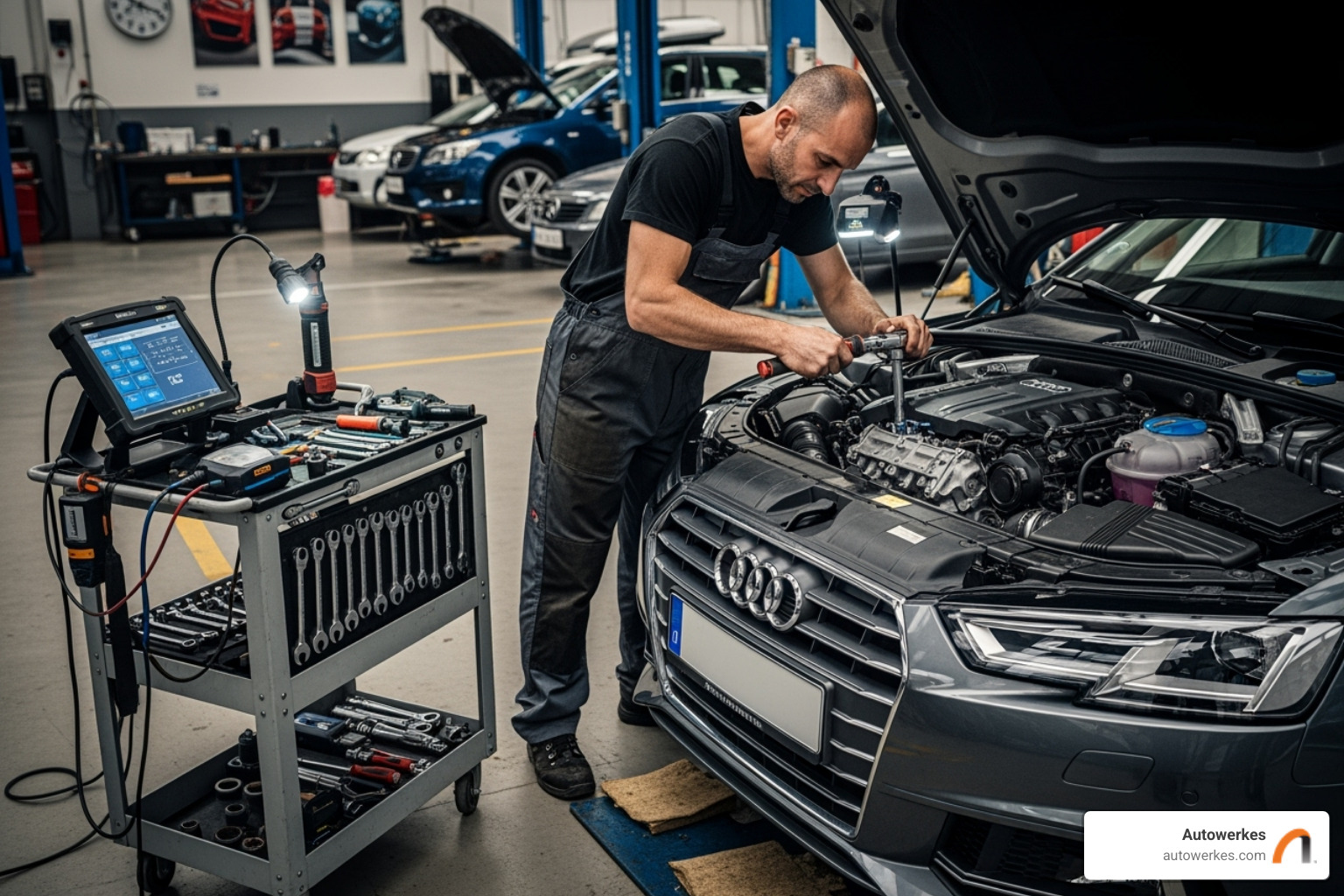How to Succeed at BMW Brake Replacement, Even if You've Failed
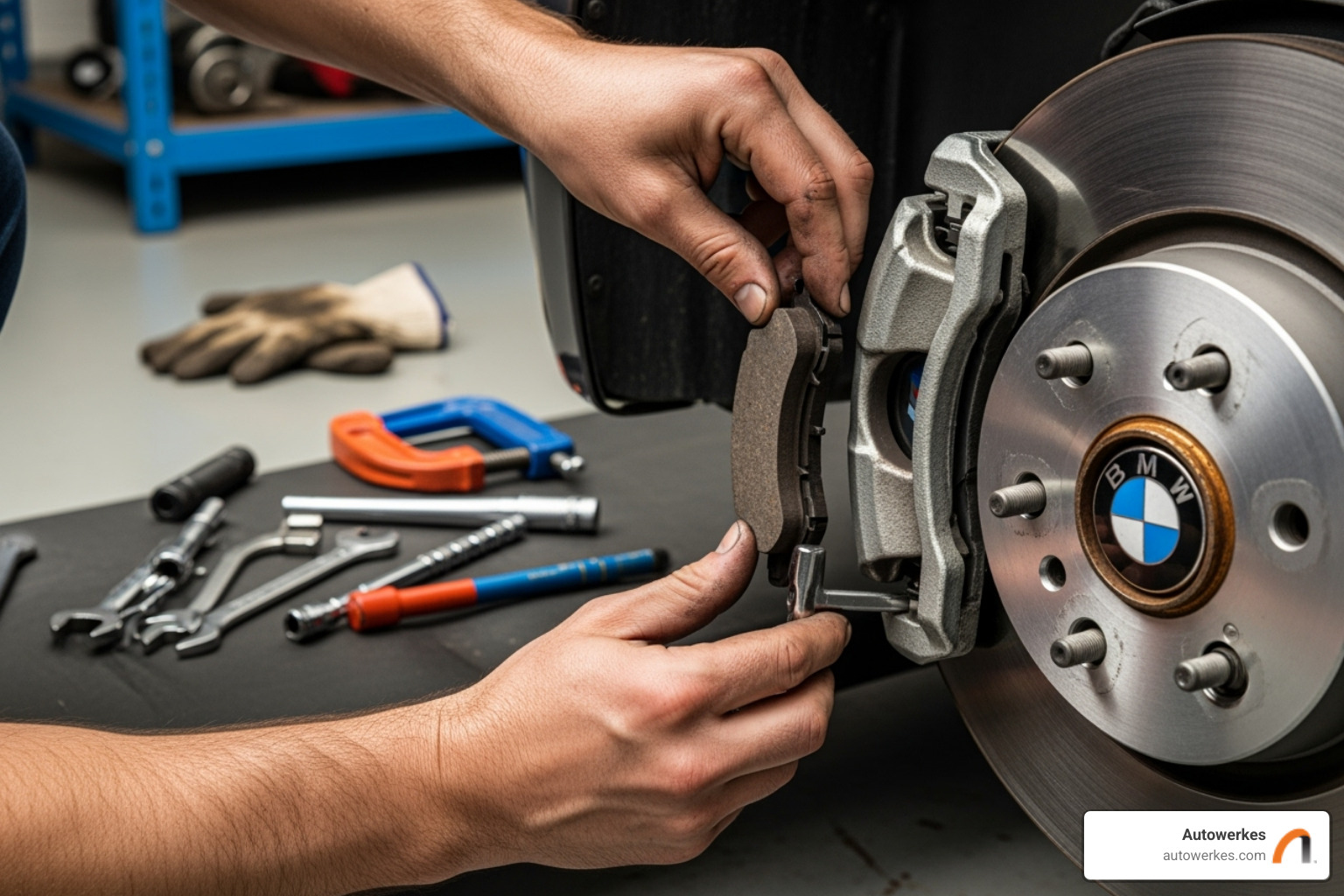
Taking Control of Your BMW's Braking System
BMW brake replacement is a critical maintenance task for keeping your luxury vehicle safe and performing at its best. Whether you're dealing with squealing brakes, dashboard warnings, or a scheduled service, understanding your options can save you time and money.
Quick BMW Brake Replacement Guide:
- Signs you need replacement: Squealing sounds, grinding noises, vibrating brake pedal, dashboard warning light
- Typical replacement intervals: Brake pads every 30,000-70,000 miles, rotors every 30,000-80,000 miles
- What to replace: Usually pads and wear sensors; rotors if worn beyond minimum thickness
- Cost factors: Vehicle model, part choice (OEM vs. aftermarket), labor complexity
- Professional vs. DIY: Consider your tools, experience, and safety requirements
It's a common scenario: you go in for a simple service and are suddenly faced with a major repair decision, like a complete front brake replacement.
The good news is you have more control than you think. Understanding your BMW's braking system, warning signs, and service options puts you in the driver's seat. The key is making an informed decision, whether you choose professional service or DIY.
Your braking system is your BMW's most important safety feature. Front brakes typically wear faster than rear brakes because they handle most of the stopping force. Modern BMWs use brake pad wear sensors that trigger a dashboard warning when about 2mm of pad material remains, signaling that replacement is needed.
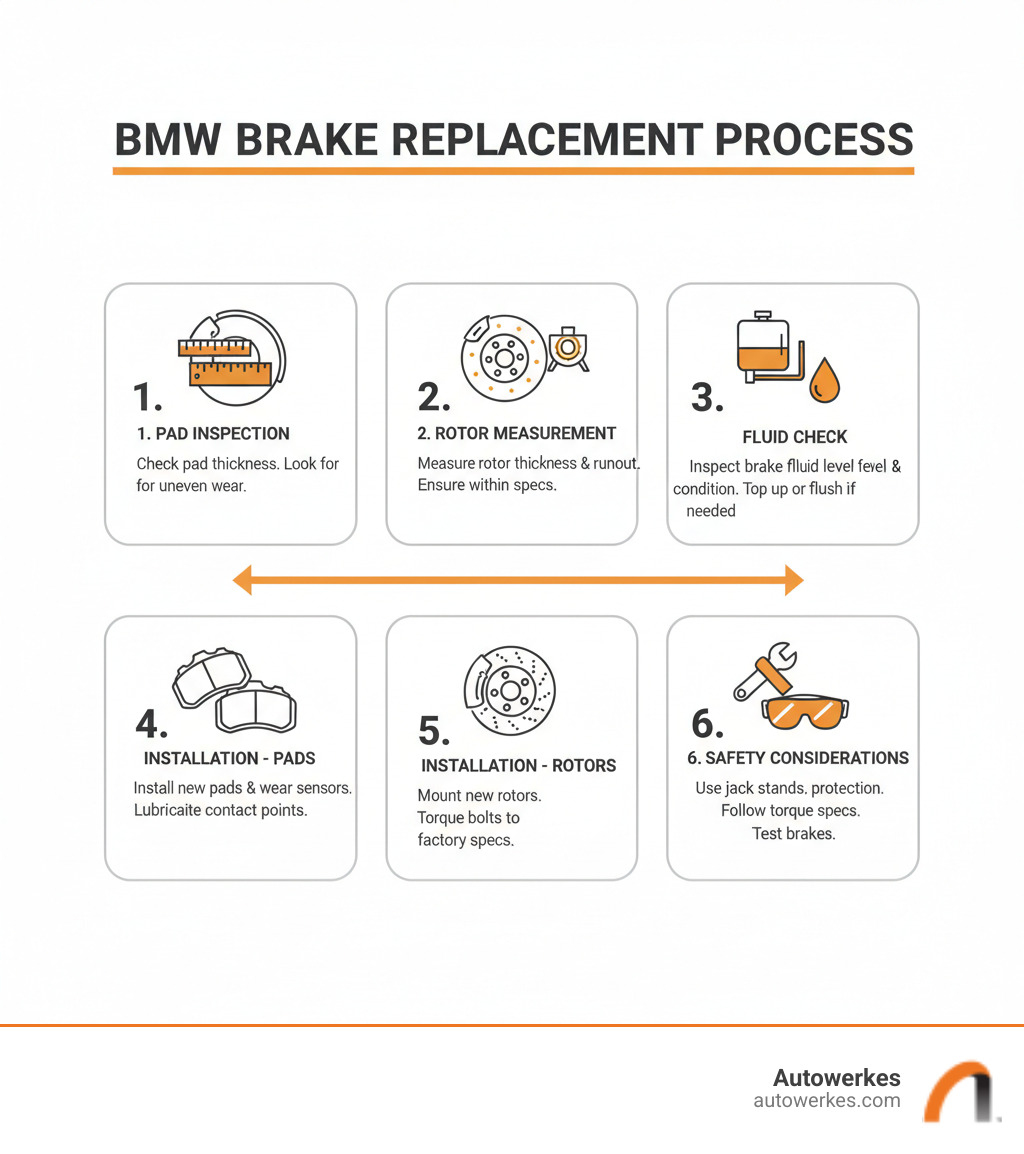
A Comprehensive Guide to BMW Brake Replacement Components
Your BMW's braking system is a precisely engineered set of components working in harmony to provide the confident stopping power you expect. Understanding these parts is key to making smart decisions about your BMW brake replacement needs.
The system uses friction: hydraulic pressure forces brake pads against spinning rotors, converting kinetic energy into heat to stop your car. BMW engineers designed each component to precise tolerances, so regular maintenance is essential for performance and safety. For a quick primer on how the components interact, see this overview of the disc brake system.
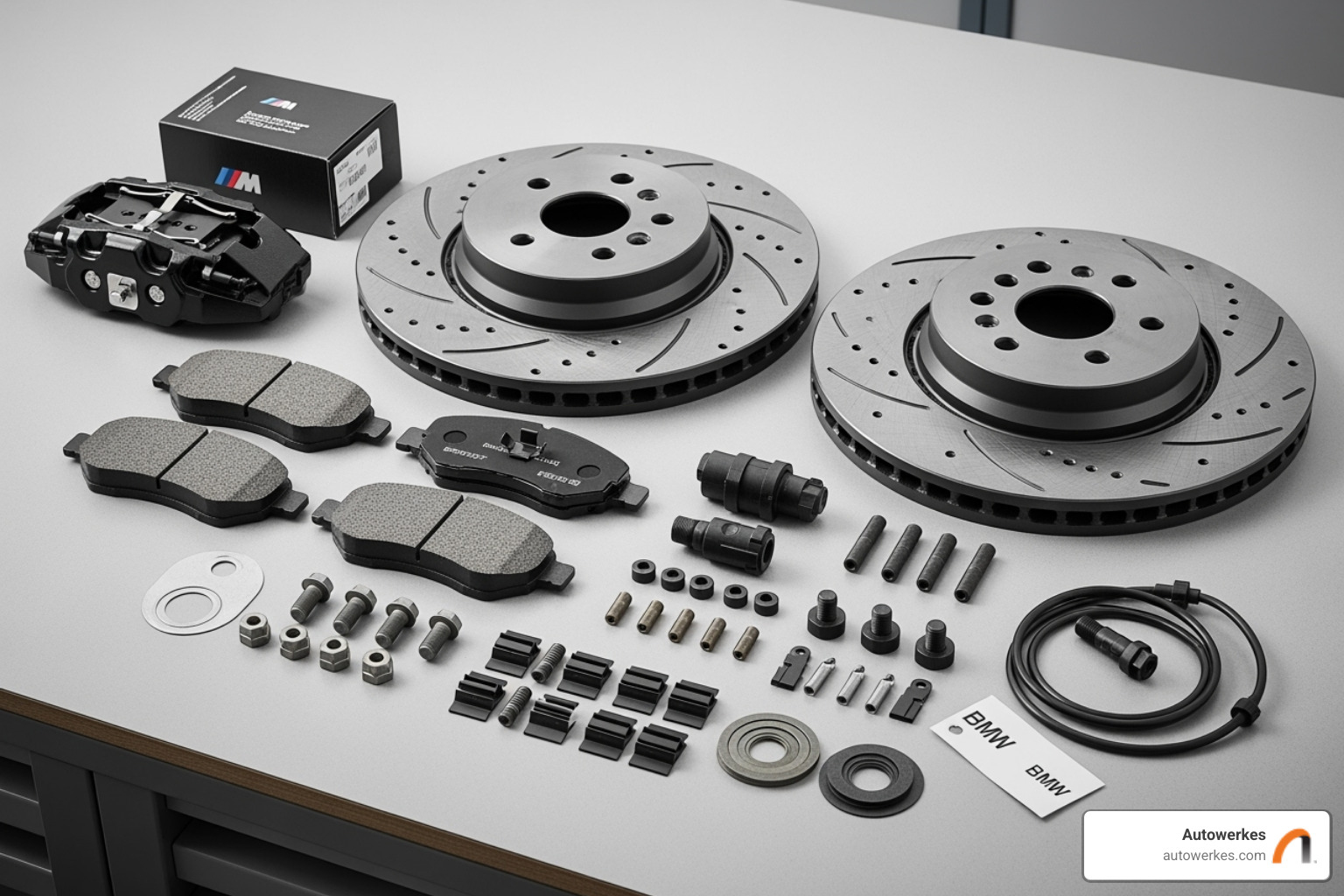
Recognizing the Telltale Signs of Worn Brakes
Your BMW communicates its needs, especially with its brakes. Recognizing warning signs saves money, prevents damage, and keeps you safe on the roads around Huntington Beach.
Squealing noises are often the first sign. Many pads have metal wear indicators that contact the rotor when the pad is thin. This high-pitched sound is your car's signal to schedule maintenance.
When squealing turns into grinding sounds, immediate action is needed. This harsh noise indicates your pads are completely worn, and metal is grinding on metal. This is a safety hazard that damages your rotors, leading to more expensive repairs.
Vibration or pulsing through the brake pedal usually indicates warped rotors from excessive heat or wear. Uneven rotors prevent consistent pad contact, causing a shudder.
Longer stopping distances are a critical safety issue. If your BMW takes longer to stop or the pedal feels less responsive, your braking system is compromised and needs immediate attention.
Modern BMWs have brake pad wear sensors that trigger a dashboard warning light when about 2mm of pad material remains. This light means a BMW brake replacement is needed soon.
Ignoring these signs leads to bigger problems: worn pads damage rotors, and damaged calipers can turn a routine service into a major repair. A little preventive maintenance saves money and stress.
If you're experiencing any of these symptoms, don't wait. Learn more about our Brake Repair services and get your BMW back to peak braking performance.
How Often Should You Replace Brake Components?
Mileage provides a guideline, but it's not the only factor. Brake pads typically last 30,000-70,000 miles, and rotors 30,000-80,000 miles. However, your driving style and local conditions can dramatically change these numbers.
Spirited driving or frequent stop-and-go traffic in Orange County means your brakes work harder and wear faster. Aggressive driving accelerates brake wear.
Brake fluid is different. BMW recommends a flush every two years, regardless of mileage. Brake fluid absorbs moisture, which lowers its boiling point and can cause a spongy pedal, compromising performance.
Heavier models like X-series SUVs stress the brakes more than lighter sedans. Even your wheels can affect brake cooling and wear. The key is paying attention to your specific situation rather than relying solely on mileage intervals. Regular inspections help catch wear before it becomes a problem.
Pads, Rotors, and Fluid: What Actually Needs Replacing?
Not every BMW brake replacement requires replacing every component. Knowing what to look for helps you make informed decisions.
Brake pads are the most frequently replaced component, designed to wear down with use.
Brake rotors last longer but must be replaced when worn below their minimum thickness specification for safety. Modern BMW rotors are typically replaced rather than resurfaced, as their design makes replacement the safer, more reliable option.
Brake pad wear sensors are single-use items. Once they trigger the dashboard light, they must be replaced with the pads.
Brake fluid is the hydraulic lifeblood. BMW specifies DOT 4 fluid for its high boiling point. A fluid flush is recommended during brake service to ensure optimal performance.
Brake calipers are robust and rarely need replacement. However, a sticking, leaking, or damaged caliper will cause uneven wear and must be addressed. Signs include the car pulling to one side when braking or fluid leaks.
What to replace depends on an inspection. While you can sometimes replace only pads and sensors, many specialists recommend replacing rotors with pads for best performance and longevity. This is why brake issues are among the 5 Common Issues to Watch Out For in BMWs that we regularly address at Autowerkes.
Navigating Your Options: Service at Autowerkes vs. DIY
Once you know your BMW needs a brake replacement, you have a decision to make: DIY or professional service? Both paths have their place.
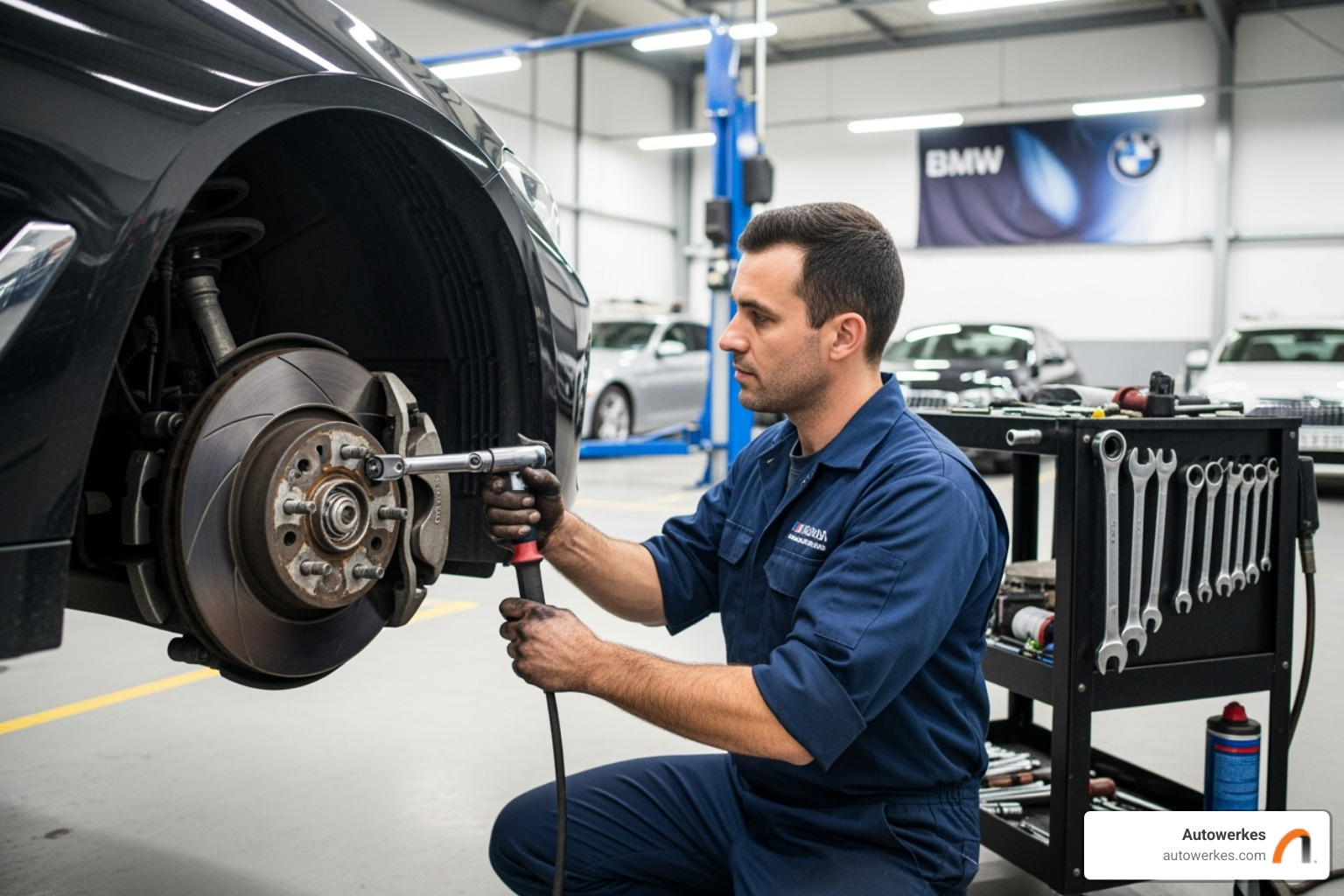
A DIY BMW brake replacement requires more than a basic socket set. You'll need a hydraulic jack, jack stands, a torque wrench, and a caliper compression tool. Many BMWs also require model-specific tools or procedures. Experience is also a factor. Are you comfortable working on your car's most critical safety system?
Professional service has clear advantages. Our ASE-certified technicians specialize in European vehicles and know BMWs inside and out. We use genuine or high-quality aftermarket parts, and our work includes a warranty. A job that could take you a weekend, we can often do in hours. Our service includes a full inspection of the entire braking system to ensure it meets BMW's standards.
Safety is paramount. We ensure your vehicle stops safely, whether you're in Newport Beach or LA traffic. We follow manufacturer specifications and use diagnostic tools to reset service indicators and verify system operation.
The True Cost of a BMW Brake Replacement
Cost is a major factor, and the price of a BMW brake replacement varies.
Your BMW model is a major cost driver. A standard 3-Series has different costs than an M-series or X5. Performance models use larger, more expensive components.
Parts choice is the biggest variable. OEM parts guarantee fit but are premium-priced. High-quality aftermarket parts offer similar performance for less, but budget options can compromise longevity. We help clients balance quality and value.
The scope of the job also affects the cost. Replacing just pads and sensors is cheaper, but we often recommend replacing rotors with pads for optimal performance. A brake fluid flush is also crucial for system health.
DIY saves on labor, but tool costs can add up. Professional service includes labor, expertise, a warranty, and peace of mind. Cutting corners on brakes is never a good idea. Investing in quality parts and professional installation is an investment in your safety.
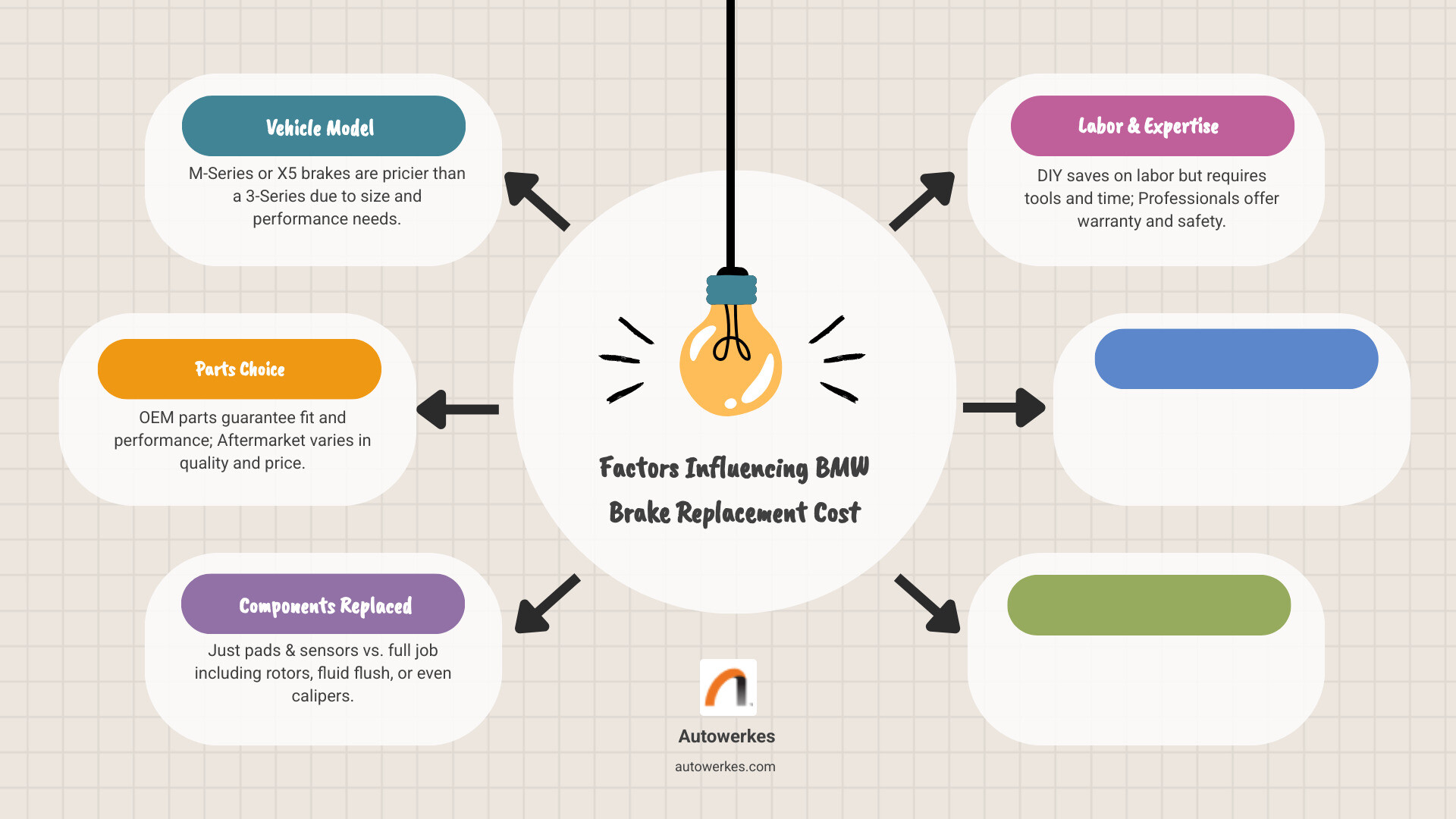
Choosing the Right Parts for Your BMW Brake Replacement
Choosing brake parts can be overwhelming. Understanding your driving style makes the choice clearer.
OEM brake pads are the safe bet, designed for your car's specific performance characteristics. They offer balanced stopping power but can be pricey and produce significant brake dust.
Ceramic pads are popular because they produce less dust, are quieter, and often last longer. For most Southern California driving, they are an excellent choice.
Performance or track pads are for extreme use and aren't ideal for daily driving. They can be noisy, dusty, and require heat to work effectively. For commuting in Huntington Beach, stick with street-oriented pads.
Brake kits simplify shopping by bundling compatible pads, rotors, sensors, and hardware, often providing better value. The key is matching parts to your driving style. Our team at Autowerkes can recommend the perfect setup for your BMW.
Making the Final Call: DIY or Trusting the Experts?
So, how do you choose?
DIY makes sense if you have the right tools, experience, and time. The savings can be significant, but be honest about your abilities. The risks are real: incorrect work can lead to brake failure, and there's no warranty on your labor.
Professional service offers expertise that's hard to replicate. Our technicians know the specific procedures for every model and use specialized tools. We guarantee our work. If you lack the tools or confidence, trusting an expert team like Autowerkes ensures the job is done right.
Your brakes are your primary safety system. Whether navigating Newport Beach traffic or cruising the Pacific Coast Highway, you need absolute confidence in their performance.
Schedule your expert BMW brake repair with us today and experience the peace of mind that comes with professional service. Your BMW - and your safety - deserve nothing less.

.svg)



